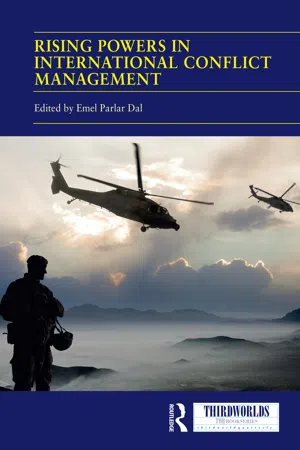ABSTRACT
Rising powers have often been characterised as ‘reluctant’ when it comes to their contributions to global governance. However, also within their regions they have sometimes pursued indecisive, muddling-through policies, including in the field of security. This paper addresses the puzzling issue of rising powers’ reluctant approach to regional crisis management. It conceptualises reluctance as entailing the two constitutive dimensions of hesitation and recalcitrance, and it seeks to approach a theorisation of reluctance that focuses on a combination of international expectations and domestic preference formation. The empirical analysis addresses instances of regional crisis management by the democratic rising powers India and Brazil during phases of domestic political stability under the Modi (2014–2018) and the Lula (2003–2011) governments, respectively. The analysis of India’s crisis management efforts in Afghanistan and Nepal, and of Brazil’s leadership of the MINUSTAH mission and its approach to the civil war in Colombia, reveal that reluctance emerges if a government is faced with (competing) expectations articulated by international actors as well as with a range of domestic factors that lead to unclear preference formation.
Introduction: reluctant powers?
Great expectations have been associated with the emergence of ‘new’ powers in world politics since the beginning of the twenty-first century. Such expectations have come primarily from policy makers, who have expected rising powers to contribute to the provision of global public goods, given their success in terms of economic growth, their increasingly proactive foreign policy and their claims for great power status.1 Academic debates have to a certain extent reflected this kind of discourse, with scholars discussing rising powers’ often limited contributions to global governance – think of rising powers’ insistence on common but differentiated responsibilities on climate governance or of their ambivalence on global crisis management. As Bisley suggests in this special issue, this might be due to them being ‘poor great powers’, lacking the capabilities to assume a managerial function in global politics. Or we could at least argue that rising powers are particularly careful about cost–benefit calculations in global public goods provision and tend to privilege domestic developmental needs. For example, rising powers have focused on the protection of their economies in global trade negotiations and they have long tended to prioritise industrialisation over climate change mitigation efforts.2
Reluctance and the impact of (competing) expectations and unclear preferences
Reluctance is ubiquitous in world politics. Indecisiveness, delaying, muddling through, disappointing the expectations of partners – these and similar attitudes are commonplace among international actors, but the phenomenon of reluctance has been largely ignored by the literature in the field of International Relations (IR). This is all the more surprising as the term is rather frequently used, not only with regard to rising powers, but also for example to the US.6 Only recently, a conceptualisation of reluctance was developed,7 but we still lack any kind of theorisation about what leads international actors to be reluctant. This contribution aims to flesh out such causal dimensions of the concept of reluctance. As Goertz points out in his seminal work, social science concepts always entail a causal dimension, and concept building is deeply interlinked with theorising.8
According to Destradi, reluctance can be understood as an analytical category that helps us grasp a ‘peculiar type or style of foreign policy that can be found across issue areas and settings’.9 Reluctance entails two constitutive dimensions, which are both necessary and jointly sufficient: hesitation and recalcitrance.10 Reluctance is a relational concept that always refers to an interaction between different actors. While the dimension of hesitation is focused on the ‘self’ – on an actor’s own internal dynamics – the second constitutive dimension of reluctance, recalcitrance, refers to an interplay with the ‘other(s)’.
Hesitation describes an ambivalent, indecisive attitude and is operationalised as entailing at least one of the following indicators: a lack of initiative, which is particularly relevant if we want to analyse how rising powers react to crises in their regional neighbourhood where they are the predominant actors; delaying, which amounts to not sticking to a previously set time frame or to ‘postponing important decisions in dealing with a specific issue or crisis’;11 or flip-flopping, which involves frequent or sudden changes in policies or statements, or contradictions, for example among the statements of members of the same government.
The second constitutive dimension of reluctance, recalcitrance, captures an unwillingness or inability to conform with the expectations articulated by others, and thereby reflects the elements of obstructionism and resistance that resonate with the notion of reluctance. Recalcitrance can be operationalised as entailing at least one of the following indicators: ignoring requests made by others or expectations articulated by others, in our specific analysis with reference to crisis management; rejecting such requests, that is, explicitly denying one’s commitment; obstructing others’ initiatives without providing a consistent alternative given one’s parallel hesitation.12
Both dimensions, hesitation and recalcitrance, need to be in place in order to classify a policy as reluctant. Both of them can occur to different degrees, thereby entailing a continuum and making reluctance, as well, a continuous concept.13 It has to be noted that, while reluctance in the political discourse is sometimes associated with a negative connotation, this contribution aims to use ‘reluctance’ as an analytical tool to grasp a particular type or style of foreign policy making that is not reflected in other existing concepts in IR. Importantly, reluctance does not simply amount to a passive foreign policy strategy. For example, a consistent refusal to get involved in a military dispute would not count as reluctant behaviour as it lacks...


